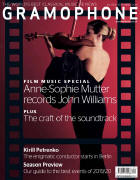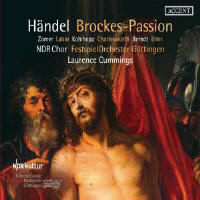Texte paru dans: / Appeared in: |
|
|
Outil de traduction (Très approximatif) |
|
|
Reviewer:
David Vickers The Passion oratorio Der für die Sünde der Welt gemarterte und sterbende Jesus is usually nicknamed the Brockes Passion after its Pietist author, the Hamburg dilettante Barthold Heinrich Brockes. Its first setting by Keiser (1712) was performed privately in the home of the poet. It is increasingly popular to claim misleadingly that Handel’s version was premiered on April 3, 1719, at the refectory of Hamburg’s Domkirche; the music was composed in London in about 1716 and sent by post, and it is difficult to believe there was not an earlier performance. August Wenzinger’s pioneering interpretation (1967), a patchy Hungarian account conducted by Nicholas McGegan (1985) and Peter Neumann’s excellent Cologne performance (2009) are now joined by this live recording made at the Göttingen Handel Festival in 2017. The opening chorus, sporadic brief chorales and a few concise turba utterances are sung with warmly rounded sonorities and precise diction by the NDR Chorus. Laurence Cummings’s unerring judgment of tempos, solemn yet dramatic pacing, articulation, shaping and textures are matched with marvellous responsiveness from the festival orchestra – led adroitly by Elizabeth Blumenstock, and with intelligent continuo-playing from cellist Phoebe Carrai, theorbist David Tayler and harpsichordist Hanneke van Proosdij. Several arias according prominence to oboes and bassoons are played with technical finesse and expressiveness. Tobias Berndt’s articulate serenity is ideal for Jesus’s pronouncements; his solemn pleading with the Father in Gethsemane is accompanied by tautly controlled strings (‘Mein Vater’). Johannette Zomer’s expressive wisdom and crystal-clear communication of the Daughter of Zion’s texts are complemented by profound artistry of discernment about when and how to embellish subtly (for example, ‘Brich, mein Herz, zerfliess in Tränen’ and ‘Die ihr Gottes Gnad’ versäumet’ – just two of the many numbers that Handel transformed for his first English oratorios Esther and Deborah). Peter’s vehement seizing his sword at Judas’s betrayal and Jesus’s arrest (‘Gift und glut’) is captured thrilling by Rupert Charlesworth, who also conveys heartbroken penitence after Peter has thrice denied knowing Jesus (‘Schau, ich fall’ in strenger Busse’). Judas’s guilt- racked suicide is depicted with sensitivity albeit slightly uneven intonation by David Erler. The Evangelist’s simple recitatives are narrated eloquently by Sebastian Kohlhepp. The live warts-andall recording does not flatter Ana Maria Labin’s relatively pinched singing as the principal Believing Soul, although her steelier timbre is a suitable counterfoil to Zomer. Most soloists reappear as verbose faithful souls whose numerous contemplations stifle the libretto’s cumbersome pacing in Part 2 – although every one of Handel’s individual short numbers is a gem, routinely performed here with bittersweet fluency. |
|




